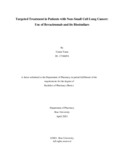Targeted treatment in patients with non-small cell lung cancer: Use of Bevacizumab and its Biosimilars
Abstract
Angiogenesis is one of the pivotal factors contributing to the development and metastasis of non small cell lung cancer which is one of the most commonly diagnosed types of lung cancer.
Bevacizumab, a monoclonal antibody that acts by restricting angiogenesis, is therefore a major
choice of medication for advanced and metastatic non-small cell lung cancer treatment.
Bevacizumab is essentially a biologic medicine which is a distinct class of biopharmaceuticals.
Biologics are considerably expensive and this has resulted in the advent of biosimilars which are
highly similar to their reference biologics in terms of quality, efficacy, and safety. As biosimilars
are adopted as affordable copies of biologics, they possess great potential to influence the
healthcare system. In this literature review, the importance of biosimilars with respect to its cost
effectiveness and accessibility to the patients were discussed. The study also focused on the
availability of biosimilars of bevacizumab as a potential targeted treatment option for NSCLC. In
the meantime, regulatory frameworks established in different countries concerning the
introduction of biosimilars in the market were reviewed.

